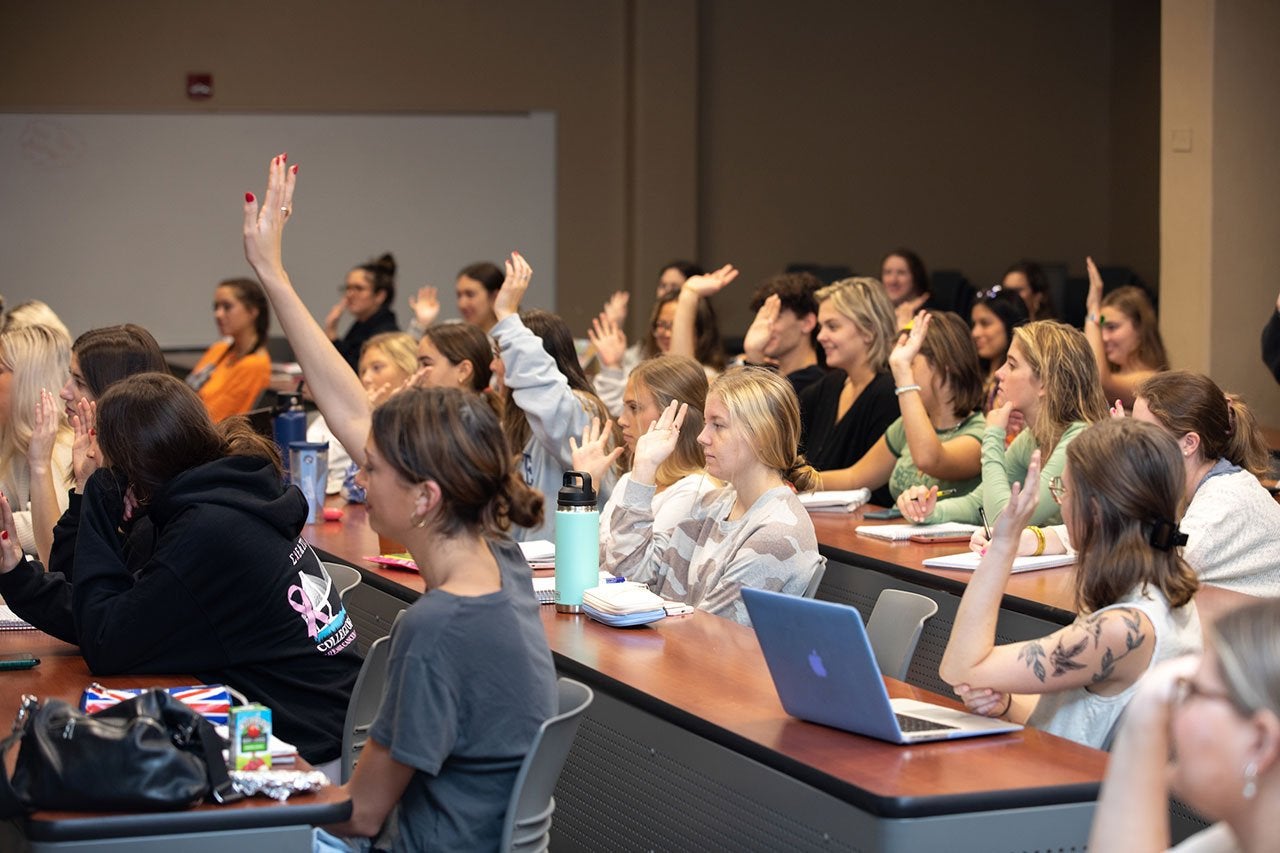Some students find themselves wanting to stay busy during the months of July and August to pass the time and get ahead in their studies without overworking themselves during their ever-so-fleeting summer break. Students with specific interests and/or hobbies may want to consider taking advantage of the unique and specific courses offered during Summer Session II (which runs July 10-Aug. 4, 2023) at the College of Charleston.
Raymond Burke, a religious studies major and rising senior at the College, who completed Contemporary Math with Applications (MATH 103) during Summer Session I, speaks from experience when he says, “It’s a quick way to cover your gen-ed requirements rather than having to take them during the course-heavy semesters.”
From an environmental ethics course that allows students to voice their opinions freely in the classroom to a class where amplifying one’s reading and writing abilities in a foreign language is the main focus, the College’s generous Summer II course offerings provide conceptual, interactive and enriching experiences both in the classroom and online.
The four classes highlighted below satisfy three of the 12 credits necessary to complete the humanities portion of the general education requirement here at the College:
Environmental Ethics (PHIL 155)
For any students interested in how to solve conflicts about environmental issues, the College has the perfect class! Ewan Kingston’s lecture on Environmental Ethics counts toward the urban studies, environmental geosciences and philosophy majors. It also satisfies a requirement for both the Environmental Studies Program and the Cultural Sustainability Certificate.
Topics discussed in this class, which meets in person, include making ethical financial choices, humans and their level of dependence on nature, personal responsibilities, diversity, environmental justice, and more.
And students get to help shape the issues that they focus on.
“It will be tailored to students’ individual interests,” says Kingston, who is an assistant professor of philosophy.
Intro to Women and Gender Studies (WGST 200)
Taught by both Malia Womack and Cristina Maria Dominguez, Intro to Women and Gender Studies is a three credit, online course offered in two sections focused on the role of intersectionality in the study of gendered structures and their consequences in contemporary cultures and societies.
Topics such as resistance, resilience and social movements will be discussed in this course as well as the examination of feminist theories and movements. The course satisfies the requirement for a race, equity, and inclusion course. Although primarily centered on the U.S., the class challenges social identity construction, heteronormativity and white privilege as they occur beyond the U.S. borders in an increasingly globalized world.
Contemporary Social Issues (SOCY 102)
If you’ve ever wanted to figure out how you can make a difference in the world, this class is for you.
Taught by sociology Professor Tracey Burkett, this online class examines how societies create, perpetuate and address contemporary social issues, including crime, poverty and economic inequality, racial, ethnic and gender discrimination, and environmental degradation.
Through online activities, students will engage in a discussion regarding their civic responsibility to become involved in efforts to address these issues in a local and global context.
Philosophy & Film (PHIL 185)
Jennifer Baker’s three credit Philosophy & Film course is fully asynchronous with no online meetings. This class encourages students to view filmmaking as a powerful art medium and focuses specifically on horror and comedy genres. The course has two major takeaways: One objective of Philosophy and Film is for students to recognize philosophical ideas depicted in each film that will be introduced, and the second is to gain perspective on cinema and film narratives. Films that will be a part of this course include Un Chien Andalou, Frankenstein, The Magnificent Seven, and more (along with a few series,’ too).
Baker says she is eager to guide her students to “look for philosophical ideas represented in film,” adding that “other fields do a great job with horror as a phenomenon, but ethicists have some interesting insights, too.”
Students can also make progress during Summer Session II on specific degree requirements. Below are examples of two study–specific courses available during Summer Session II aimed at real estate minors and Spanish majors or minors with experience in the language.
Real Estate (REAL 310)
In Emma Xu’s Principles of Real Estate class, a basic foundation of the real estate world is provided, covering topics such as property rights, ownership, property evaluation, and so on. Students who enroll in this course will develop analytical skills in market research, evaluation, risk, and investment analysis.
“Students should be able to understand the functions of the real estate market and perform basic analysis in real estate research after taking this class,” says Xu, an assistant professor of real estate.
For any HGTV fans or aspiring realtors at the College, this three credit, online course is one to keep in mind!
Writing Skills Through Culture (SPAN 313)
And for students who want to flex their language muscles, Susan Divine, associate professor of Spanish, is teaching the course Writing Skills Through Culture, which is a three-credit course directed towards (but not limited to) Spanish majors and minors.
As an online course, Divine’s goal is for students to become more sophisticated writers in Spanish through reading, writing and analyzing Spanish texts, such as short stories, essays and even short films. With one-on-one Zoom meetings incorporated into the course, students will be able to receive personalized feedback from Divine so they feel supported in finding their voice in Spanish and can become more confident writers, speakers and thinkers in their second or even third language.
For additional information about these or other courses offered during Summer Session II, visit summer.cofc.edu.





